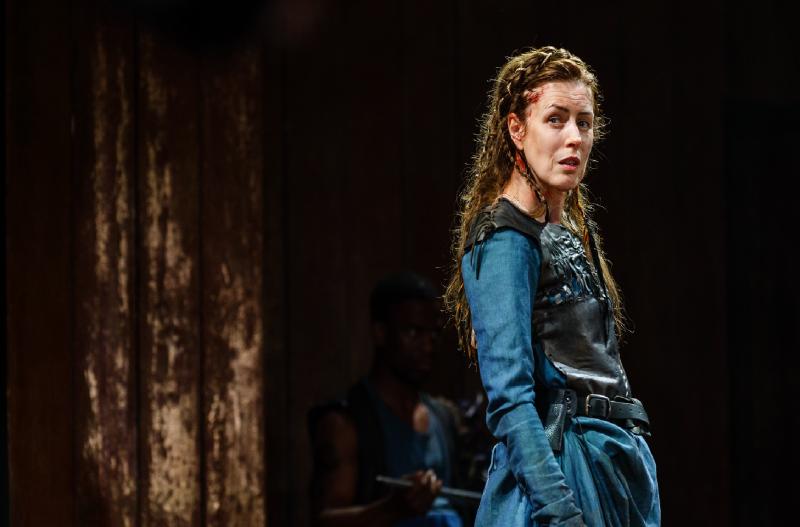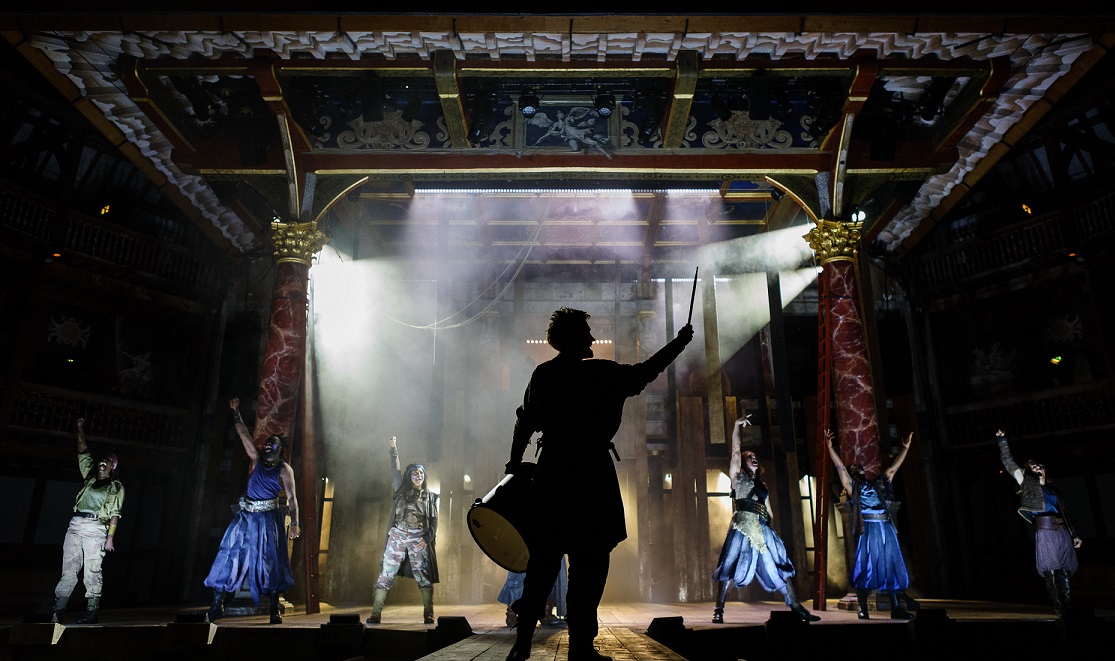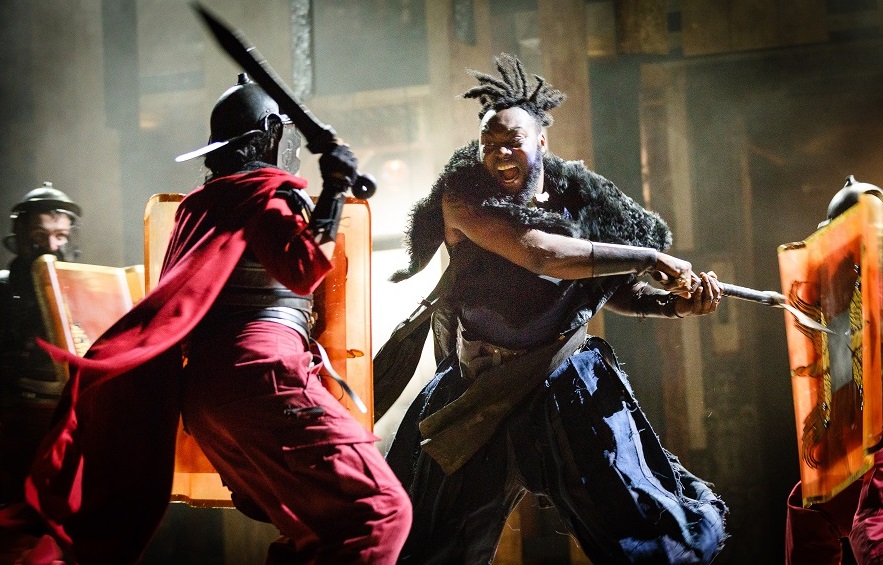Boudica, Shakespeare's Globe review - ancient history made compellingly contemporary | reviews, news & interviews
Boudica, Shakespeare's Globe review - ancient history made compellingly contemporary
Boudica, Shakespeare's Globe review - ancient history made compellingly contemporary
A British queen brought to life: Tristan Bernays’s new play fits its venue perfectly

History comes to the stage of the Globe only rarely – at least if you compare the frequency of productions there from that segment of the Shakespearean canon against the tragedies and comedies – which is certainly one reason to welcome Boudica.
Given that Bernays has written much of his play in iambic pentameters, there’s no avoiding going back to the bard himself for frames of reference. I couldn’t help catching glimpses in the title role here of great Shakespearean heroines as diverse as Cleopatra and Lady Macbeth, which is high praise for both the writing and McKee’s performance. There may be a hint of Lear, and especially Cymbeline in the setting, though this version of early Britain is far more material than mythic, its inhabitants defined by their varieties of wildness which are set against the studied civilisation that is the dominant tone of the Roman occupation. Bernays structures the edifice of his play confidently, leading us into the action through a scene-setting chorus, played with calypso nimbleness by Bethan Clark. Then we're straight into a trio of Roman sentinels complaining about the hardship of their northern posting – “I don’t think the summer ever comes” – to bring the tone rather comically back down to earth. Boudica certainly explores the vernacular vividly: there's a lot of effing and blinding, occasionally perhaps overused even as it contrasts nicely with the elevation of the “higher” verse.
Bernays structures the edifice of his play confidently, leading us into the action through a scene-setting chorus, played with calypso nimbleness by Bethan Clark. Then we're straight into a trio of Roman sentinels complaining about the hardship of their northern posting – “I don’t think the summer ever comes” – to bring the tone rather comically back down to earth. Boudica certainly explores the vernacular vividly: there's a lot of effing and blinding, occasionally perhaps overused even as it contrasts nicely with the elevation of the “higher” verse.
The setting is Camulodunum (today’s Colchester, the first capital of Roman Britain), where the effete procurator Catus Deciamus (Samuel Collings) has assembled the tribal kings for a feast marking the death of King Prasutagus, the late leader of the Iceni. Although Rome has clearly allowed these local rulers a degree of nominal autonomy – there's something perhaps of the princely states of British India – it’s clear that Catus controls the economic strings, and with them the balance of power.
This is accomplished writing, staged with verve, and played with real aplomb
The dramatic and linguistic register changes appreciably with the appearance of Boudica, the estranged widow of Prasutagus, with her daughters Alonna (Joan Iyiola) and Blodwynn (Natalie Simpson). McKee as Boudica has an impressive bearing that belies the relative slightness of her figure, her nobility and independence ringing out clearly as she utters her claim to half of her late husband’s inheritance. She’s no match, however, for the slick casuistry of Catus, who counters that the profligate monarch had practically pawned his estate to the Romans for drink, and that anyway Roman law works differently from British law. He certainly leaves no room for argument, promptly ordering Boudica to be flogged and her daughters raped by the entire garrison. So much for so-called civilisation…
But Boudica is determined on action, her ambition no less than to expel the colonisers from the island (there are loose allusions aplenty to Brexit, though they are more multi-faceted than direct). She sets about bringing together an alliance of other tribal rulers, uniting an unlikely coalition that includes the diplomatic Cunobeline (Forbes Masson, engaging with a Scottish twang) alongside the ferocious Badvoc, played massively by Abraham Popoola (“there’s madness, then there’s Badvoc”: Popoola, pictured below).
But their initial military success in storming Camulodunum precipitates a denouement that will divide the Icenian queen, her daughters and their allies. Raising a modern issue, it hinges on the treatment of prisoners; the Brexit references are muddied by the fact that any nostalgia for “this isle as it once was” is hard to reconcile with the savagery that is the habit of the victor. Bernays further complicates our perspectives through the presence of another Roman leader, Suetonius (Clifford Samuel), an outsider who stands apart from the rest of the venal imperial pack, and he gets most of the play’s soliloquies to convey his point of view. Such elements make us ponder to what extent Bernays was aiming for cod Shakespeare, and his narrative structure occasionally can’t avoid seeming too reliant on the kind of interspersing scenes that occupy a page or two of text. But if Boudica may not quite live up to its venue linguistically, in dramatic terms Eleanor Rhode’s production absolutely does, mixing stylisation with moments of powerful stillness: she keeps the action agile, and uses the full opportunities of the space, abseiling included. Tom Piper’s design adapts the stage with similar inventiveness (and contrasts the two opposing sides beautifully through distinctions of colour), backed up by Malcolm Rippeth’s original lighting design (which gives particular atmosphere to Boudica's last moments), and a drum-led score from Jules Maxwell.
Such elements make us ponder to what extent Bernays was aiming for cod Shakespeare, and his narrative structure occasionally can’t avoid seeming too reliant on the kind of interspersing scenes that occupy a page or two of text. But if Boudica may not quite live up to its venue linguistically, in dramatic terms Eleanor Rhode’s production absolutely does, mixing stylisation with moments of powerful stillness: she keeps the action agile, and uses the full opportunities of the space, abseiling included. Tom Piper’s design adapts the stage with similar inventiveness (and contrasts the two opposing sides beautifully through distinctions of colour), backed up by Malcolm Rippeth’s original lighting design (which gives particular atmosphere to Boudica's last moments), and a drum-led score from Jules Maxwell.
We even get a couple of raucous Clash songs in the second half, the kind of touch that in some of the Globe’s recent transpositions of setting – I’m remembering this Summer of Love season-opener Romeo and Juliet particularly – has come across as very hokey indeed, but here somehow fits most engagingly. A number of productions from Emma Rice’s short tenure seem to have riven audiences (who loved them) apart from critics (who largely didn’t). It’s not the least achievement of Boudica that it leaves no such impression: this is most accomplished writing, staged with verve, and played with real aplomb.
The future of Arts Journalism
You can stop theartsdesk.com closing!
We urgently need financing to survive. Our fundraising drive has thus far raised £33,000 but we need to reach £100,000 or we will be forced to close. Please contribute here: https://gofund.me/c3f6033d
And if you can forward this information to anyone who might assist, we’d be grateful.

Subscribe to theartsdesk.com
Thank you for continuing to read our work on theartsdesk.com. For unlimited access to every article in its entirety, including our archive of more than 15,000 pieces, we're asking for £5 per month or £40 per year. We feel it's a very good deal, and hope you do too.
To take a subscription now simply click here.
And if you're looking for that extra gift for a friend or family member, why not treat them to a theartsdesk.com gift subscription?
more Theatre
 Elektra, Duke of York's Theatre review - Brie Larson's London stage debut is angry but inert
Brie Larson makes a brave West End debut that, alas, misfires
Elektra, Duke of York's Theatre review - Brie Larson's London stage debut is angry but inert
Brie Larson makes a brave West End debut that, alas, misfires
 First Person: writer Lauren Mooney on bringing bodies together in the new Royal Court play, 'More Life'
Kandinsky Theatre co-creator on a new play tethering technology to existence
First Person: writer Lauren Mooney on bringing bodies together in the new Royal Court play, 'More Life'
Kandinsky Theatre co-creator on a new play tethering technology to existence
 Oedipus, Old Vic review - disappointing leads in a production of two halves
Is it a dance piece with added text, or a stripped down play with excess choreography?
Oedipus, Old Vic review - disappointing leads in a production of two halves
Is it a dance piece with added text, or a stripped down play with excess choreography?
 Mrs President, Charing Cross Theatre review - Mary Todd Lincoln on her life alone
Curious play that fails to mobilise theatre's unique ability to tell a story
Mrs President, Charing Cross Theatre review - Mary Todd Lincoln on her life alone
Curious play that fails to mobilise theatre's unique ability to tell a story
 … Blackbird Hour, Bush Theatre review - an unrelentingly tough watch
New play about mental breakdown is a mix of acute distress and poetic writing
… Blackbird Hour, Bush Theatre review - an unrelentingly tough watch
New play about mental breakdown is a mix of acute distress and poetic writing
 Inside No 9: Stage Fright, Wyndham’s review - uneven fright-night from the fêted duo
Still inventive and fun but short on sharp shocks
Inside No 9: Stage Fright, Wyndham’s review - uneven fright-night from the fêted duo
Still inventive and fun but short on sharp shocks
 Cymbeline, Sam Wanamaker Playhouse review - pagan women fight the good fight
A new, if not as radical as once it were, take on Shakespeare's cross-dressing call to arms
Cymbeline, Sam Wanamaker Playhouse review - pagan women fight the good fight
A new, if not as radical as once it were, take on Shakespeare's cross-dressing call to arms
 An Interrogation, Hampstead Theatre review - police procedural based on true crime tale fails to ring true
Rosie Sheehy and Jamie Ballard shine in Edinburgh Festival import
An Interrogation, Hampstead Theatre review - police procedural based on true crime tale fails to ring true
Rosie Sheehy and Jamie Ballard shine in Edinburgh Festival import
 The Lonely Londoners, Kiln Theatre review - Windrush Generation arrive in a London full of opportunities, but not for them
Memories, frustrations and hopes in a city emerging from post-war austerity
The Lonely Londoners, Kiln Theatre review - Windrush Generation arrive in a London full of opportunities, but not for them
Memories, frustrations and hopes in a city emerging from post-war austerity
 Kyoto, Soho Place Theatre - blistering, darkly witty play raises more questions than it answers
The script turns dry-as-dust diplomatic detail into nothing less than an adrenaline sport
Kyoto, Soho Place Theatre - blistering, darkly witty play raises more questions than it answers
The script turns dry-as-dust diplomatic detail into nothing less than an adrenaline sport

Add comment